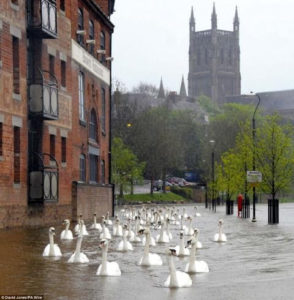The Spiritual Practice of Disaster: From So Hard to So Ham
 Soham is a Hindu Mantra meaning “I am (s)He/That” in Sanskrit. In Vedic Philosophy it means identifying oneself with the universe or ultimate reality. Soham means that my Individual Self is my Universal Self. Soham is also called the Hamsa mantra, because when sung in repetition it elicits the sound Hamsa. In Sanskrit, the word Hamsa represents a white swan that symbolizes the Individual Self. Paramahamsa, the Universal Self, is reflected as Individual Self, or Hamsa, in all of us; in other words, the God(dess) in all of us.
Soham is a Hindu Mantra meaning “I am (s)He/That” in Sanskrit. In Vedic Philosophy it means identifying oneself with the universe or ultimate reality. Soham means that my Individual Self is my Universal Self. Soham is also called the Hamsa mantra, because when sung in repetition it elicits the sound Hamsa. In Sanskrit, the word Hamsa represents a white swan that symbolizes the Individual Self. Paramahamsa, the Universal Self, is reflected as Individual Self, or Hamsa, in all of us; in other words, the God(dess) in all of us.
Drugs plague the community where I choose to reside. At its laziest moments, my mind can ride the pop-psychology-recipe for “right and wrong” and condemn those who fall victim to the drugs-of-no-choice that run the streets of the 7th Ward. It’s the one-size-fits-all narrative that relates drug use to the “weak,” the “criminal,” the “desperate,” the “pathetic”- the other. Like so many folks who don’t reach for drugs as their first means of relief, I sometimes find myself seduced by proliferation of this storyline – or I did until recently, when I hurt my neck.
Without going into the throes of inane-hard-life-misalignment details, I hurt my neck and I don’t exactly know how. As a yoga teacher, gardener, builder, community mama, person who uses their body to make ends meet- this was a disaster. Three weeks into the mostly unbearable pain- and three weeks into various treatments, called-in favors, and secret promises to the Universe-nothing changed except an aggrandized projection of fear and burgeoning hopelessness. I didn’t know where the pain originated and after reaching deeply into the arsenal of incredible healers who surround me, no one could tell me when it would be over. I was begging the unknown for help. It was in the shadow of hopelessness, of fear, of perceived personal disaster that my heart softened open and ineffably understood those who reach for narcotics to end their suffering.
Without going into the politics of the War on Drugs and privilege (’cause you know I would love to), I offer this story to say my judgment was assuaged by the compassion only made available in the midst of a personal catastrophe.
Collective disasters have the same potential. They can throw you into a supersaturated space of compassion and understanding in a way that is both transcendent and spiritual. When our ordinary patterns are abruptly shattered, we are presented with a unique and often surprising opportunity to move towards our true nature, towards each other, towards God. For those who desire awakening, disaster may catalyze the shift from So Hard, to So Ham.
Louisiana was underwater again. And again we were forced to reorient ourselves, to remember where we live: Planet Earth. Not heaven, not Nirvana, not Shangri-la, and it is certain that we will encounter natural and unnatural states of emergency again. As the adage goes, it wasn’t raining when Noah built the arc. Perhaps the best preparation for the next flood/ earthquake/ heartbreak/ neck injury would be to preemptively strengthen our compassion.In The Yoga Sutras, Master Patanjali says that strength comes from practicing kindness to others (YS.3.24). By focusing our energy on building the (long) “arcs” of justice, generosity, tolerance, and Love. To practice the centering principles of So Ham without needing the catalyst of disaster (see Metta meditation below).
When it is not diluted by consumer culture, Love is muscular, it is spiritual, uncertain, untamable, and physical- the density of Love needs to be exercised, massaged, nurtured and practiced. Disaster throws us into the unknown without the burden of a collective narrative and can awaken the very essence of our true nature of love, compassion, kindness and boundless generosity. As we rearrange the constellation of our personal and collective tragedies we must ask why it is we wait for disaster to exercise our true nature when there is already so much work for Love to do.
Disaster can destroy our bodies, our homes, and our possessions, but it can also destroy our limiting beliefs. The evolution of belonging broadens in disaster, shifting from us-to-them, me-to-you, from So Hard… to So Ham.
Written by jackSun sLaughter
October, 2016